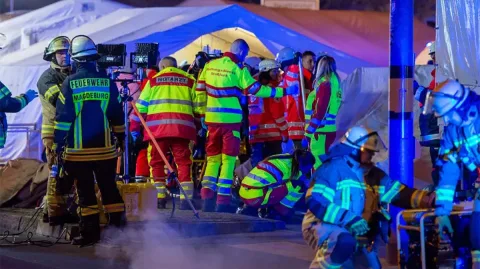A United Nations report on Somalia says no side in the country’s conflict has the strength…
 A United Nations report on Somalia says no side in the country’s conflict has the strength to impose its will on the others and stabilize the chaotic, war-torn nation.
A United Nations report on Somalia says no side in the country’s conflict has the strength to impose its will on the others and stabilize the chaotic, war-torn nation.
The report, compiled by the U.N. Monitoring Group on Somalia, was presented to the U.N. Security Council Tuesday after portions were leaked to news organizations last week.
The authors say the Somali transitional government is weakened by corruption “at all levels” and that its soldiers are mainly loyal to individual government officials or military officers.
They say insurgent groups like al-Shabab and Hizbul Islam are better organized and disciplined but lack popular support and are equally likely to suffer internal divisions.
The report makes recommendations for improving the situation, including sanctions against designated individuals and entities, and a review of a 1992 arms embargo that the authors say is routinely violated.
The Monitoring Group also calls on Eritrea to stop subsidizing members of Somali opposition groups and allow the inspection of any facilities allegedly used for training Somali insurgents.
The U.N. and United States have repeatedly accused Eritrea of arming the insurgents. Tuesday’s report said Eritrea appears to have scaled down its military assistance while continuing to provide political, diplomatic and possibly financial support.
The Security Council discussed the report in a closed-door session Tuesday. Afterward, the chair of the council’s Somalia Sanctions Committee, Mexican ambassador Claude Heller, said the council generally backs the report but has not taken any decision yet on the authors’ recommendations.
He said there is a consensus for an independent probe into allegations of corruption in the World Food Program’s Somalia operations. The report says up to half of all food aid for Somalia is diverted to militants, corrupt food transporters, and local WFP personnel.
The report also warns that the conflict is having an increasing impact abroad. It says Somalia’s neighbors are already involved in the conflict or soon will be, and that al-Shabab is recruiting funds and fighters in Somali diaspora communities.
It says the “most obvious” symptom of the war and its economic effects is Somali piracy. The report accuses senior figures in Somalia’s Puntland region of allowing the pirates to remain free and says some have accepted campaign contributions from pirate leaders.
The report also says weapons continue to enter Somalia at a steady rate despite a 1992 arms embargo. It says the primary sources of supply are Yemen and Ethiopia, but that U.S. and Ugandan contributions to the government have also entered Somali arms markets.
Source:Voa





